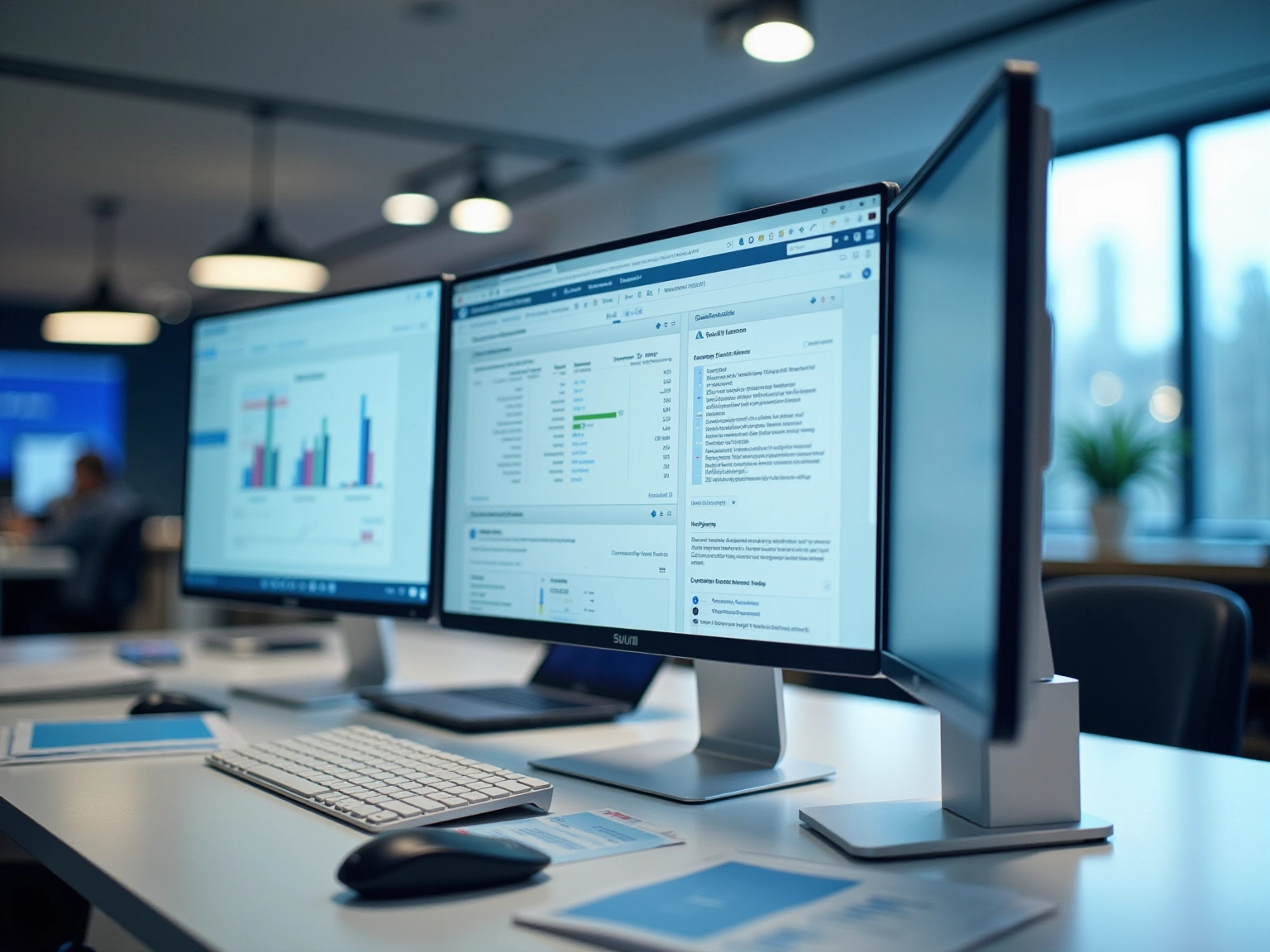Overview
This article provides a critical comparison of professional accounting software, emphasising essential features and pricing structures. It highlights the significance of functionality, user interface, integration, customer support, security, and scalability in today’s accounting landscape. Notably, Glasscubes emerges as a formidable contender, designed to enhance productivity and client engagement through its intuitive interface and adaptable pricing models. Its robust capabilities, including automated reminders and real-time reporting, are further validated by user feedback, indicating substantial time savings, particularly during tax seasons. By choosing Glasscubes, accounting managers can effectively navigate current challenges and streamline their operations, ultimately driving greater efficiency and client satisfaction.
Key Highlights:
- Functionality is critical, with features like invoicing, payroll, and reporting being essential for diverse accounting needs.
- A user-friendly interface enhances productivity and minimizes training time, exemplified by Glasscubes’ intuitive design.
- Integration capabilities streamline workflows and improve data management, vital for modern accounting practices.
- Pricing structures should be evaluated for cost-effectiveness, with Glasscubes offering flexible subscription options without yearly commitments.
- Quality customer support is crucial for maintaining productivity, with Glasscubes providing dedicated onboarding and telephone assistance.
- Security measures must protect sensitive data and ensure compliance with regulations like GDPR.
- Scalability is important for accommodating business growth, with Glasscubes designed to support increasing user demands.
- Glasscubes features automated reminders and real-time reporting to enhance client communication and accountability.
- User feedback highlights significant time savings, with reports of up to 288 hours saved in a tax season using Glasscubes.
- A case study indicates only 15% of small enterprises currently use financial management tools, revealing growth opportunities.
Introduction
In the rapidly evolving landscape of accounting, selecting the right software can indeed be a game-changer for firms aiming to enhance efficiency and client engagement. With a plethora of options available, understanding the key criteria for evaluation becomes crucial. This article delves into the essential factors that accountants should consider when choosing accounting software, encompassing:
- Functionality
- User interface
- Pricing
- Customer support
By thoroughly exploring these dimensions, firms can make informed decisions that not only streamline their operations but also foster stronger relationships with clients. As technology continues to reshape the accounting profession, the right software can empower firms to thrive in a competitive marketplace.
Key Comparison Criteria for Accounting Software
When assessing financial software, several essential criteria should be prioritised:
-
Functionality: Evaluate the breadth of features available, including invoicing, payroll, tax compliance, and reporting capabilities. A robust functionality set in professional accounting software is essential for meeting diverse accounting needs. For instance, the company provides automated reminders and real-time visibility across all clients, significantly enhancing the functionality of information gathering.
-
User Interface: The application’s ease of use and intuitiveness can significantly influence user adoption and operational efficiency. A user-friendly interface minimises training time and enhances productivity. Glasscubes is designed to be as simple and convenient to use as email, ensuring that accountants can quickly adapt without extensive training.
-
Integration: Consider the software’s ability to seamlessly integrate with other tools and platforms. The use of professional accounting software for effective integration streamlines workflows and improves data management, which is vital for modern accounting practises. The platform supports unlimited client requests and storage, facilitating smooth integration into existing workflows.
-
Pricing Structure: Evaluate the cost-effectiveness of the software, including subscription models and potential hidden fees. Understanding the total cost of ownership is essential for budgeting and financial planning. The company provides a monthly subscription without any yearly obligation, making it a versatile choice for accounting firms.
-
Customer Support: The quality and availability of customer service can be critical for resolving issues promptly. Reliable support ensures that accountants can maintain productivity without significant downtime. The company offers dedicated onboarding assistance and telephone support, enhancing the overall user experience.
-
Security: Examine the measures in place to safeguard sensitive financial data, particularly compliance with regulations such as GDPR. Security is paramount in protecting client information and maintaining trust. The platform is secure, encrypted, and GDPR compliant, ensuring peace of mind for both firms and clients.
-
Scalability: Evaluate the system’s ability to expand with the business, supporting a rising number of users or transactions. Scalable solutions are essential for firms anticipating growth. With features that facilitate effective information collection and client interaction, Glasscubes is ideal for firms aiming to grow.
These standards are crucial in assisting accountants and firms in selecting professional accounting software that aligns with their particular operational needs. For instance, automation in accounts payable can reduce paperwork by 90-95% and enhance efficiency by 20-27%, demonstrating the importance of functionality in software selection. Additionally, companies utilising cloud accounting exclusively have reported a 15% year-over-year revenue growth, underscoring the value of integrating advanced technology into accounting practises. Furthermore, a case study reveals that only 14% of paper invoices are processed on the day they arrive, highlighting significant delays in traditional invoicing methods and the potential benefits of automation. By concentrating on these essential aspects, companies can make well-informed choices that improve their operational efficiency and customer engagement. As Harry Lees noted, 53% of small business owners strongly agreed that their accountant is a trusted adviser, emphasising the importance of selecting software that supports this vital relationship.
Features Overview: What Each Software Offers
Glasscubes:
- A comprehensive client portal designed to efficiently gather tax, audit, and payroll information.
- With automated reminders and real-time reporting, communication is streamlined, enhancing accountability and ensuring that no requests are overlooked while responses remain organised.
- Unlimited client requests and storage eliminate the common constraints associated with traditional email communication, allowing for seamless collaboration without the risk of misplaced information.
- The intuitive user interface requires no training, facilitating quick adoption by accounting teams and promoting confidence in client interactions.
- Secure, encrypted, and GDPR compliant, Glasscubes provides peace of mind for both your firm and clients.
- Visual progress reports enable clear tracking of outstanding requests and queries, ensuring efficient information gathering.

Pricing Comparison: Evaluating Cost-Effectiveness
Pricing for professional accounting software varies widely based on features and user requirements. To effectively navigate this landscape, consider the following detailed comparisons:
-
Glasscubes:
- Offers competitive pricing tailored for accounting firms that prioritise robust client engagement tools. With support packages ranging from £1,500 per annum for the Bronze plan to £4,500 per annum for the Gold plan, Glasscubes ensures that firms can choose a plan that best fits their operational needs. Each package includes features such as a 99.9% uptime guarantee, varying response times for support, and unlimited client requests, making it an excellent choice for enhancing client engagement and streamlining information gathering.
-
QuickBooks:
- Starts at approximately £25/month for basic features, with higher tiers providing advanced functionalities that cater to growing business needs.
-
Xero:
- Pricing begins at around £10/month for the starter plan, increasing based on the number of users and additional features required, making it a flexible option for small businesses.
-
Sage:
- Ranges from £15 to £59/month, depending on the features and level of support needed, allowing businesses to choose a plan that aligns with their operational demands.
-
FreshBooks:
- Plans start at £15/month, with extra costs for advanced features and additional users, appealing to freelancers and small businesses seeking simplicity and efficiency.
When evaluating the cost-effectiveness of professional accounting software, it is essential to consider not only the monthly charges but also the potential time savings and efficiency enhancements each programme can provide. For instance, firms utilising Glasscubes have reported significant time savings, with users like Sophie Montgomery of TaxAssist Accountants noting an impressive 288 hours saved in a single tax season. This underscores the importance of assessing professional accounting software not solely on cost but also on the benefits it provides for workflow enhancement and client interaction.
As Warren Buffett aptly stated, ‘Financial reporting is the language of business,’ emphasising the need for efficient financial tools in enhancing communication and productivity. Additionally, a case study from 2017 showed that only 15% of small enterprises used financial management tools, highlighting a considerable opportunity for growth in the use of technology in financial practises. With more than 50% of financial executives anticipating that the advancement of automated and intelligent financial systems will greatly influence finance firms over the next 30 years, investing in contemporary solutions is becoming increasingly pertinent. Ultimately, businesses should assess the cost-effectiveness of professional accounting software based on their specific needs and budget, ensuring they select a tool that not only meets their requirements but also enhances their operational efficiency.
User Experience Insights: Real Feedback from Users
User experiences with accounting software reveal significant advantages; here are key insights from users of the platform:
- The platform: Users report saving up to 288 hours during a single tax season. One user emphasised that the setup procedure was remarkably simple and seamless, resulting in positive feedback from customers who appreciated having a unified, secure workspace for all their information and inquiries. This streamlined communication has facilitated quicker responses from customers, as the audit team found it easier to request information through Glasscubes compared to traditional email methods. The platform’s automated reminders and user-friendly interface of the professional accounting software receive frequent praise, enhancing client engagement and operational efficiency.

Conclusion
Selecting the right accounting software is a pivotal decision that can significantly impact a firm’s efficiency and client relationships. By focusing on key criteria such as:
- Functionality
- User interface
- Integration
- Pricing structure
- Customer support
- Security
- Scalability
firms can effectively navigate the vast array of options available in the market. Each of these factors plays a crucial role in ensuring that the software not only meets operational needs but also adapts to the evolving landscape of accounting.
Functionality is paramount; robust features like invoicing, payroll, and automated reminders can streamline processes and reduce administrative burdens. A user-friendly interface enhances adoption and productivity, while seamless integration with existing tools promotes efficient workflows. Additionally, understanding pricing structures and ensuring reliable customer support are essential for maintaining operational continuity. Security and scalability cannot be overlooked, as they safeguard sensitive information and prepare firms for future growth.
Ultimately, investing in the right accounting software, such as Glasscubes, can lead to substantial time savings and improved client engagement, as evidenced by user testimonials and case studies. As the accounting profession continues to evolve, leveraging advanced technology is not just beneficial—it’s imperative for firms looking to thrive in a competitive environment. The right software empowers accountants to focus on what truly matters: providing exceptional service and building lasting relationships with clients.
